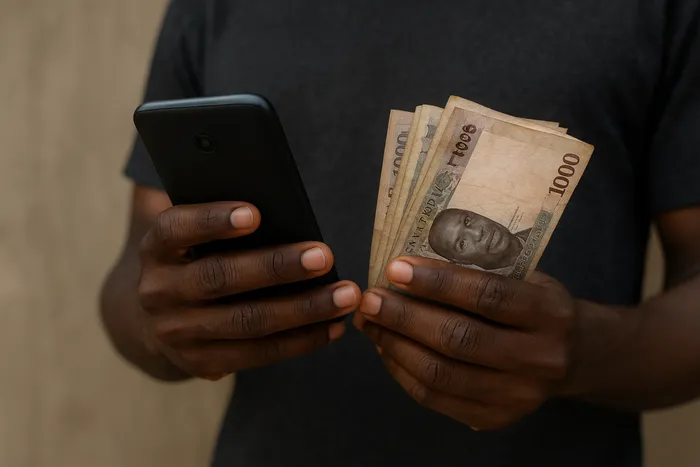
Image: Generated
Mariam Ogundairo's experience highlights a common issue: predatory loan apps. She borrowed ₦30,000 (about twenty dollars) and was charged 21.6% interest, due in two weeks. When she couldn't repay the loan, the app engaged in "contact shaming" by contacting her personal contacts, a tactic often used by lenders in Nigeria for debt recovery. This, along with threats and leaked images, is a standard and coercive business practice. A simple annualised cost of over 560% on a 21.6% bi-weekly charge demonstrates that this is not legitimate credit but a form of digital extortion.
A high-rate economy meets low-road finance
Nigeria faces a challenging economic landscape. Essential reforms like fuel-subsidy removal and exchange-rate adjustments have led to significant price increases and currency devaluation, severely impacting households. As of January 2025, headline inflation reached 24.48%, and the Central Bank's policy rate stands at 27.50%, making traditional bank lending prohibitively expensive even for established businesses. In this difficult climate, seemingly convenient apps offering "instant cash" at "low rates" appear to offer relief during tough times. However, these platforms often exploit the vulnerable, extracting their dignity and personal data.
Consumer credit outstanding reached ₦3.82 trillion by December 2024, a 21.27% increase from September, with personal loans disbursed in Q4 alone amounting to approximately ₦470 billion. This indicates that survival finance has become a mass market, not a niche. The social harm escalates as rapidly as balance sheets when lenders exploit this market through opaque pricing and weaponised data.
Enforcement theatre, not deterrence
Even with regulatory efforts, exploitative digital moneylenders in Nigeria persist. The Federal Competition and Consumer Protection Commission (FCCPC) has established a public register for digital lenders and announced interest rate monitoring and penalties for predatory pricing in 2025. However, these lenders frequently circumvent sanctions by rebranding, distributing via off-store APKs, and quickly reappearing online. For instance, in mid-2024, 47 apps were removed from Google Play, only for many to resurface under new names. This issue is compounded by the fact that borrowers often install these apps without verifying their approval status.
A market characterised by misaligned incentives and an enforcement rhythm that predators can outmaneuver allows loan sharks to thrive due to weak sanctions. This isn't a rhetorical flourish but an accurate depiction of the situation. Citizens' Gavel, a civil society organisation, has documented numerous abuses, including defamatory bulk SMS messages and the non-consensual sharing of contacts and images, tactics that would be considered criminal in any traditional collection scenario. These efforts by civil society have partially addressed the existing gaps.
Kenya’s hard-won lesson
Kenya's experience with digital credit offers a valuable, albeit imperfect, lesson. Following a surge in debt shaming, Nairobi responded not merely with public statements, but by leveraging the Data Protection Act and implementing a licensing framework for digital credit providers. This framework linked market access directly to compliance with data protection regulations.
The Office of the Data Protection Commissioner took decisive action, imposing fines on lenders who illegally accessed phone books and harassed contacts, amounting to KES 9.3 million in penalties in 2023 alone. They have continued to issue orders and fines, including a 2025 penalty against Whitepath for unlawful data usage. As enforcement strengthened, reported cases of debt shaming dramatically decreased. The clear message was: violate privacy, incur financial penalties, and ultimately, risk losing your license.
Abuja has not fully utilised three key levers to accelerate Nigeria's progress. Firstly, the Federal Competition and Consumer Protection Commission (FCCPC) approval and data-protection compliance should be a strict prerequisite for app distribution. This means no app should be listed on any store without current certificates from both the FCCPC and the Nigeria Data Protection Commission, with automatic takedown for any breach. Secondly, a standardised "total cost of credit" box is necessary, detailing interest, fees, and late-charge schedules in naira and as a simple annualised cost, presented before any disbursement. Thirdly, penalties need to be escalated. Contact mining and doxxing should lead to criminal liability for executives, not just corporate fines. Kenya's approach to escalating penalties successfully shifted behaviors, and Nigeria should adopt a similar or more stringent stance.
The wider African caution: when trust erodes, scams scale
This issue extends beyond just loans; it concerns digital trust. East Africa's recent CBEX crypto-Ponzi scheme, which was only shut down after extracting billions in local currency across several countries, demonstrates the rapid spread of fraud when enforcement lags behind innovation. Predatory loan apps operate similarly, utilising viral distribution, cross-border functionality, and targeting a desperate consumer base. If authorities permit the expansion of personal lending to outpace the capacity for consumer protection, the outcome is foreseeable: an increase in cases like Mariam's, greater humiliation, and heightened social risk.
Nigeria possesses the institutional framework to address this issue. The Central Bank of Nigeria's (CBN) prudential tools, the Federal Competition and Consumer Protection Commission's (FCCPC) registry and investigative authority, and the Nigeria Data Protection Commission's (NDPC) enforcement mandate can be integrated to create a unified regulatory checkpoint. This would involve data-compliant licensing, swift platform-level takedowns, and executive liability.
Coupling this with a public credit-price dashboard, regular mystery-shopper audits, and targeted prosecutions for harassment and defamation would fundamentally alter the business model. Until such measures are implemented, labeling these applications as "financial inclusion" is a misnomer. True inclusion broadens options and fosters resilience. What many Nigerians are currently experiencing is digital extortion disguised as convenience, a practice that will persist until the costs of predatory behavior finally outweigh the profits.
Written By:
Sesona Mdlokovana
Associate at BRICS+ Consulting Group
Africa Specialist
** The views expressed do not necessarily reflect the views of IOL or Independent Media.